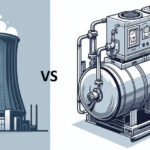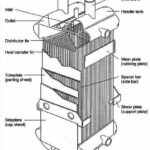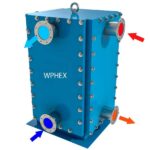Panhandle equation was developed by Eastern Pipe line company for the calculation of gas flow in transmission lines. In 1940s Panhandle A Equation was developed. In 1912 Weymouth developed the general gas flow equation so this equation was developed at a later stage.
Panhandle Equation
Panhandle A Equation
Panhandle A Equation is developed for natural gas pipelines, this equation makes use of pipeline efficiency factor that is normally a decimal value less than 1. The panhandle A equation is valid for Reynolds numbers range of 5 million to 11 million.
Panhandle equation can be expressed in terms of flow as shown below:
In US Customary system units
\[Q\ =\ 435.8\ \cdot\left(\frac{T_b}{P_b}\right)^{1.0788}\cdot\left(\frac{P_1^2-e^sP_2^2}{G^{0.8539}T_fL_eZ}\right)^{0.5394}.\ D^{2.6182}\cdot\ E\]
Where;
Q - volumetric flow rate, standard ft3/day (SCFD) E - pipeline efficiency, decimal value less than 1.0 Pb - base pressure, psia Tb - base temperature, oR (460 + oF) P1 - upstream pressure, psia P2 - downstream pressure, psia G - gas gravity (air = 1.00) Tf - average gas flow temperature, oR (460 + oF) Le - equivalent length of pipe segment, miles Z - gas compressibility factor, dimensionless D - pipe inside diameter, in
In SI Units
Panhandle equation and be expressed as follows in system international units
\[Q\ =\ 4.5965\cdot10^{-3}\cdot\left(\frac{T_b}{P_b}\right)^{1.0788}\cdot\left(\frac{P_1^2-e^sP_2^2}{G^{0.8539}T_fL_eZ}\right)^{0.5394}.\ D^{2.6182}\cdot\ E\]
Where;
Q - volumetric flow rate, standard m3/day E - pipeline efficiency, decimal value less than 1.0 Pb - base pressure, kPa Tb - base temperature, oK (273 + oC) P1 - upstream pressure, kPa P2 - downstream pressure, kPa G - gas gravity (air = 1.00) Tf - average gas flow temperature, oK (273 + oC) Le - equivalent length of pipe segment, km Z - gas compressibility factor, dimensionless D - pipe inside diameter, mm
Equivalent transmission factor
This friction factor is calculated by comparing the general flow equation, mainly used to compare results.
In US Customary system units
\[F\ =\ 7.2111\cdot\left(\frac{Q\cdot G}{D}\right)^{0.07305}\cdot E\]
In SI Units
\[F\ =\ 11.85\cdot\left(\frac{Q\cdot G}{D}\right)^{0.07305}\cdot E\]
Panhandle B Equation
This equation is also known as revised Panhandle equation, it was published in 1956. Mainly used for larger pipe diameters and high pressure transmission pipelines. The panhandle b equation is generally accurate for Reynolds numbers ranging between 4 million to 40 million.
The equation doesn’t account for different pipe surfaces. it uses a pipeline efficiency factor that has a decimal value less than 1.
Panhandle equation can be expressed in terms of flow as shown below:
In US Customary system units
\[Q\ =\ 737\ \cdot\left(\frac{T_b}{P_b}\right)^{1.02}\cdot\left(\frac{P_1^2-e^sP_2^2}{G^{0.961}T_fL_eZ}\right)^{0.51}.\ D^{2.53}\cdot\ E\]
Where;
Q - volumetric flow rate, standard ft3/day (SCFD) E - pipeline efficiency, decimal value less than 1.0 Pb - base pressure, psia Tb - base temperature, oR (460 + oF) P1 - upstream pressure, psia P2 - downstream pressure, psia G - gas gravity (air = 1.00) Tf - average gas flow temperature, oR (460 + oF) Le - equivalent length of pipe segment, miles Z - gas compressibility factor, dimensionless D - pipe inside diameter, in
In SI Units
Panhandle equation and be expressed as follows in system international units
\[Q\ =\ 1.002\cdot10^{-2}\ \cdot\left(\frac{T_b}{P_b}\right)^{1.02}\cdot\left(\frac{P_1^2-e^sP_2^2}{G^{0.961}T_fL_eZ}\right)^{0.51}.\ D^{2.53}\cdot\ E\]
Where;
Q - volumetric flow rate, standard m3/day E - pipeline efficiency, decimal value less than 1.0 Pb - base pressure, kPa Tb - base temperature, oK (273 + oC) P1 - upstream pressure, kPa P2 - downstream pressure, kPa G - gas gravity (air = 1.00) Tf - average gas flow temperature, oK (273 + oC) Le - equivalent length of pipe segment, km Z - gas compressibility factor, dimensionless D - pipe inside diameter, mm
Equivalent transmission factor
This friction factor is calculated by comparing the general flow equation, mainly used to compare results.
In US Customary system units
\[F\ =\ 16.7\cdot\left(\frac{Q\cdot G}{D}\right)^{0.01961}\cdot E\]
In SI Units
\[F\ =19.7\cdot\left(\frac{Q\cdot G}{D}\right)^{0.01961}\cdot E\]
Summary table
| Description | Panhandle A Equation | Panhandle B Equation |
|---|---|---|
| Published | Early 1940s | 1956 |
| Reynolds number range | 5 – 11 Million | 4 – 40 Million |
| Efficiency factor (E) | less than 1 and normally assumed as 0.92 | less than 1 and generally varies between 0.88 – 0.94 |
| Pipeline diameters | generally 12 – 60 inch (305 – 1524 mm) | generally used for larger pipelines > 36 inch ( > 914 mm) |
| Pressure | around 800 – 1500 psia (5516 – 10342 kPa) | > 1000 psia ( > 6895 kPa) |
Other Useful links
Process engineering calculator – desktop version
Process engineering calculator – Android app version











